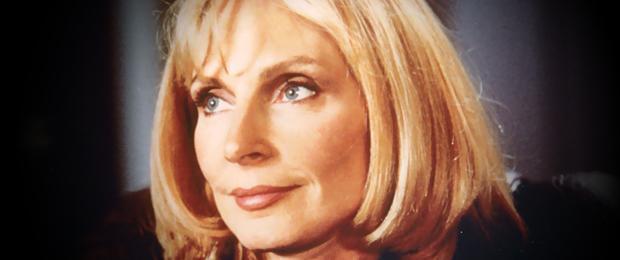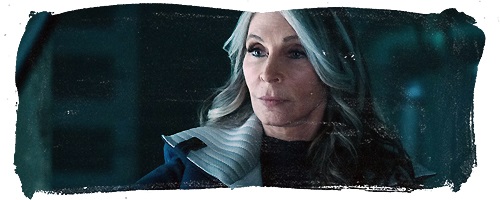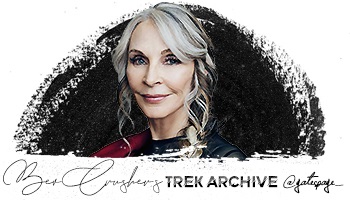
Star Trek Staff
September 13, 2012

Gates McFadden, in part one of our interview, discussed reuniting with her Star Trek: The Next Generation co-stars for a series of conventions, dissected the character of Dr. Beverly Crusher and chatted about directing Denise Crosby in a production at her theater company, Ensemble Studio Theatre/LA. Today, in part two of our conversation, McFadden comments on how the fans – and she – have changed over the years, talks in detail about her involvement with Ensemble Studio Theatre/LA, and recounts directing the TNG episode “Genesis.”
You mentioned that you’re doing some conventions with full TNG cast reunions. Have the fans been as vocal and passionate as ever?
McFadden: The fans, actually, to me, have been different since I’ve come back. There have been a couple of other generations growing up. I’m no spring chicken. I’m the old chicken now. I think that it’s pretty amazing when I hear people who are in their late 30’s say, “I grew up watching you.” I think, “Wow.” I still feel I’m trying to grow up. But I feel that there’s something different because the world is different. We have so many complexities. I think that people look at Star Trek as something that really is that possibility. I know that this is what we said years ago, and it’s true. I don’t even know how to express it, but there is something I find different. I find the fans are less demanding and there’s this “We’re all in it together” kind of thing. We’re all trying to figure out what the world is going to be like, what the future is going to be like, and they appreciate the iconic characters.
I’m sure that this is my perspective that’s changed because I don’t have a clue, really, what the fans are going through and what’s different. So, for me — let me make it clear – for me, something has changed. I’m not quite sure what it is. Maybe I feel better because I’m supporting the theater to go out to the fan events. I don’t know. I’m doing it for a very clear reason and I feel that I’m understood, finally. So maybe it’s me. I can’t say that the fans have changed. I don’t know if they’ve changed or not. Only they know if they’ve changed. But I’ve changed.
How much acting are you doing these days?
McFadden: I’m acting a lot, actually, but I do a lot of it through the theater. I’m going to be doing something at the Getty Villa on November 3 and 4. I have a part in a reading of three plays that are part of The Vesuvius Prophecies, a trilogy that’s a co-production that we did at Ensemble Studio Theatre/LA in a development process. A friend of mine was the producing-director on Franklin & Bash, and so I have a recurring role as a judge on that. Then, I do other acting at my theater, and sometimes I direct. I’m also basically the artistic director. That’s the big role and it’s pretty much dawn to dusk. I had to even quit my teaching at USC because it’s really a full-time job.
You were part of the Ensemble Studio Theatre in New York. Was that association what led you, ultimately, to becoming the artistic director for the Los Angeles wing?
McFadden: I am a member of the company in New York, and I did several plays with them years ago. One of them was To Gillian on Her 37th Birthday. Major playwrights have come out of that company: Mamet, John Patrick Shanley, Richard Greenberg, just a ton of amazing writers. A bunch of us ended up coming out to L.A. and so we became a non-profit here. I was doing Star Trek, so I wasn’t as active. Occasionally I’d do a play. Two and a half years ago they asked me if I’d consider being artistic director. I’d never wanted to do that. It hadn’t even really occurred to me. I was going to share the position with this playwright who I’d never met, and I was very impressed with him when I did meet him. I said, “Well, I’ll try it for six months.” What happened was we started with this beautiful play, which we later won many awards by doing, which was called Tree, by Julie Hebert, who was the writer-producer of Numbers and she writes a lot for The Good Wife and directs for them. We were in the middle of beginning to cast this production and my co-artistic director had a major problem and had to leave within a week.
So there I was, on my own, and I didn’t want the company to go do on my watch. I was like, “Hmm, I guess I’d better take this on fully. At the same time, I met, through one of my students at USC, a developer of this really cool area in Los Angeles, called Atwater Village. It’s really, really a lovely, fabulous area. It’s near Silver Lake and Las Feliz. It’s for the group that does not want to just be Beverly Hills. It’s much more like New York and Chicago. It’s got all sorts of people and not everybody looks like they’re working with trainers all day long. I found this space and the developer said, “Would you be interested in turning it into a theater if I helped put up the money to try to do some of the work.” And I got hooked, because I really do love creating something. Having an actual space made all the difference in the world. It was still just a Herculean task.
Then I picked this other partner company, a very much younger company called Circle X, who really do very edgy, terrific work. I thought, “Well, if I have a partner company, I could maybe do it.” And it’s worked. There was nothing happening when we went into this area, and now it’s really vibrant. There are 29 townhouses across the street that are just getting finished up. There are restaurants and all these artists’ lofts, and it’s a very cool artists’ area. We’ve got the two best bakeries in L.A. as far as I’m concerned. So I love this area and our first really big season was in 2011. We only do world premieres. We are not a theater that does classics. We are about developing new ideas. It’s very Gene Roddenberry, really. It’s about new ideas, dealing with the issues, but doing it in an entertaining way, really making people think and being provocative.
Let’s loop that back to Star Trek. What idea/notion/philosophy from Trek did you most appreciate?
McFadden: I loved, for example, the Prime Directive. I thought that was brilliant. And I loved how that was in conflict with the Hippocratic Oath. How those two are in conflict is really, really interesting. Which one is right? There’s no easy answer. It’s very complex. That, to me, is the world we’re leaving in and that engages me.
Last question. You’ve been directing for your theater company. We’re wondering: what did you learn from your experience directing the TNG episode “Genesis”?
McFadden: I learned a heck of a lot. I learned how many details and choices there were. I had much more respect for how difficult it is to write and direct and producer. There was so much, even as an actor, about hitting marks and doing things like that. I also had so much fun because I could explore the set in a way that I hadn’t before, by using the camera as something that moved and gave me choreography. It was thrilling to explore things that had never been explored before and that I really was interested in doing. What does the ship look like when it’s messy? It was interesting to find ways to take an image that was in the script, but turning it into something where I went, “No, I think that would be spookier, to have Troi in her uniform and hair coming off.” To be able to create in that way was absolutely thrilling for me.
We actually had the Northridge earthquake happen while I was directing. Some of the crew members who had lost their houses were coming in because they were being so supportive, because they knew how much it meant to me to do this show. It was really something. I learned so much, and it really was, I think, probably my happiest time in all the years I was doing it because I was just working on all cylinders and loving getting these incredible performances out of cast members I loved. People just went 100 percent for me. They had to be in makeup and wait around for a long time. I thought Michael Westmore’s makeup was the best in all the years he did the show. He is so brilliant and he just knocked it out of the park. It’ll be interesting to see the episode when they get to that season with the Blu-rays. The Blu-rays are gorgeous, I think.














